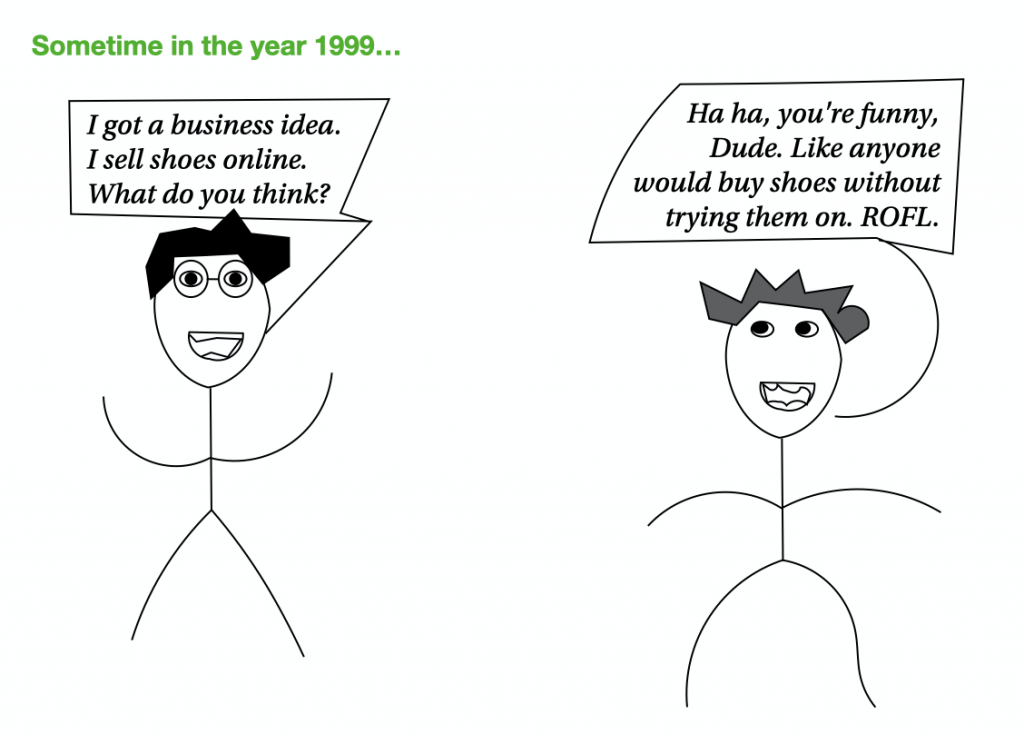Founding can sometimes be frustrating. Especially in the early stages, when the own idea is still a pure fantasy. Everyone who is told about the idea has his own opinion. It’s like in the Colosseum at the end of a gladiator fight. The emperor stretches his hand and raises or lowers his thumb. The fate of the idea is sealed. But what to do with critical feedback?

Many founders I coach let critical feedback on their idea throw them off their game. If negative feedback comes repeatedly, they often give up their idea. In principle it is good to be open to feedback. BUT, feedback is often a subjective judgment of what has been heard and therefore similar to the idea, speculative. Nevertheless feedback can be exciting. However, we have to ask ourselves FROM WHOM feedback is helpful and on WHICH topics? The following feedback is helpful:
1. Feedback from the TARGET GROUP: A friend of mine has launched a gold token on Blockchain technology, with which small or large amounts of gold can be bought online quickly and easily. 100 tokens represent 1 gram of gold. The purchased gold is then stored in Switzerland. Let’s assume that my friend had discussed his idea at an early stage with his (fictive) 80-year-old uncle, who is not interested in online-related matters. What would his feedback on a virtual gold token look like? Customer feedback should therefore be strongly oriented towards the target-group of the business idea. The feedback session should focus strongly on real customer behaviour (=facts; e.g. what do you do with your crypto assets in a turbulent market phase?) and not on the general evaluation of the business idea (=opinion; what do you think of my idea?). Ideally, these conversations should also generate facts: “Do you want to buy 100 Gold Tokens now?” vs. “How likely are you to buy Gold Tokens in the future?”… more on this topic, however, in a later, more detailed article on the Lean Startup method.
2. Feedback from EXPERTS: If you clean out your grandma’s attic and you find a beautiful old oil painting. Do you ask your neighbor, your uncle or your best friend how much this old oil painting is worth? Or would you rather ask an art expert about its value? Experts are able to give a good estimation of an issue due to their long lasting, real experiences (=facts) in a field. When I enter into an exchange with experts on a business idea, I am usually interested in the rules of the market I am targeting, and the challenges or hurdles the experts see. An evaluation of the business idea by the expert is possible, but should not always be taken at face value. Depending on the degree of innovation of the idea, it can exceed the imagination of the expert. For example, in the early stages of online shoe retailing I had talked to numerous retail experts about it and each of them told me with absolute certainty that these business models have no future, because customers want to try shoes before buying them and the high return rate of online shipping would destroy any company in terms of costs. However, as it turned out, this is not the case.
3. Feedback from other FOUNDERS: A few weeks ago I wrote an article on Quora. A team of founders wanted to launch a vegan, fair trade protein bar. If I were a co-founder in that team, I would try to initiate an exchange of thoughts with other food start-ups. The closer the other team is to my market, the better, of course. BUT the team can also learn a lot from food start-ups in completely different food categories. Many topics remain the same, e.g. how do I get on the shelf at food retailers? Other start-ups are often an exciting source of insights, as they operate under similar conditions (e.g. low budget). When exchanging experiences with other founders, I focus on strategies, procedures and learnings that the other team has already made.
For experts as well as for other founders, their network can also be very interesting. Who do they know? Who else in their network could make a contribution to the own business idea? Here you can also ask for an introduction. AND DO NOT FORGET: Always ask your counterpart how you can help him or her! I always ask if I can be of any help. So do not just try to take, but also to give.
In sum, the opinion of target customers, experts and other founders is very valuable. Since they are opinions, however, they must be handled with care. Not everything should be taken at face value and the own idea should not be discarded at the first criticism, but at the same time critical comments should be taken seriously. They should be checked. Ideally, the points of criticism raised by the discussion partners are falsified with real data. In this way, facts about the own business idea are created. For example, the number of search queries for keywords of the business idea can give an indication of the extent to which customers actively seek solutions in the targeted area. A landing page can also be used to easily check how expensive it is to generate a newsletter signup or an order. Here we are talking about facts, no longer about opinions. “It is difficult to sell shoes online” becomes “acquiring a customer costs me 15 Euros”. Founders should try to generate facts for their business idea early on. But that is another story, more about it in another dedicated article.